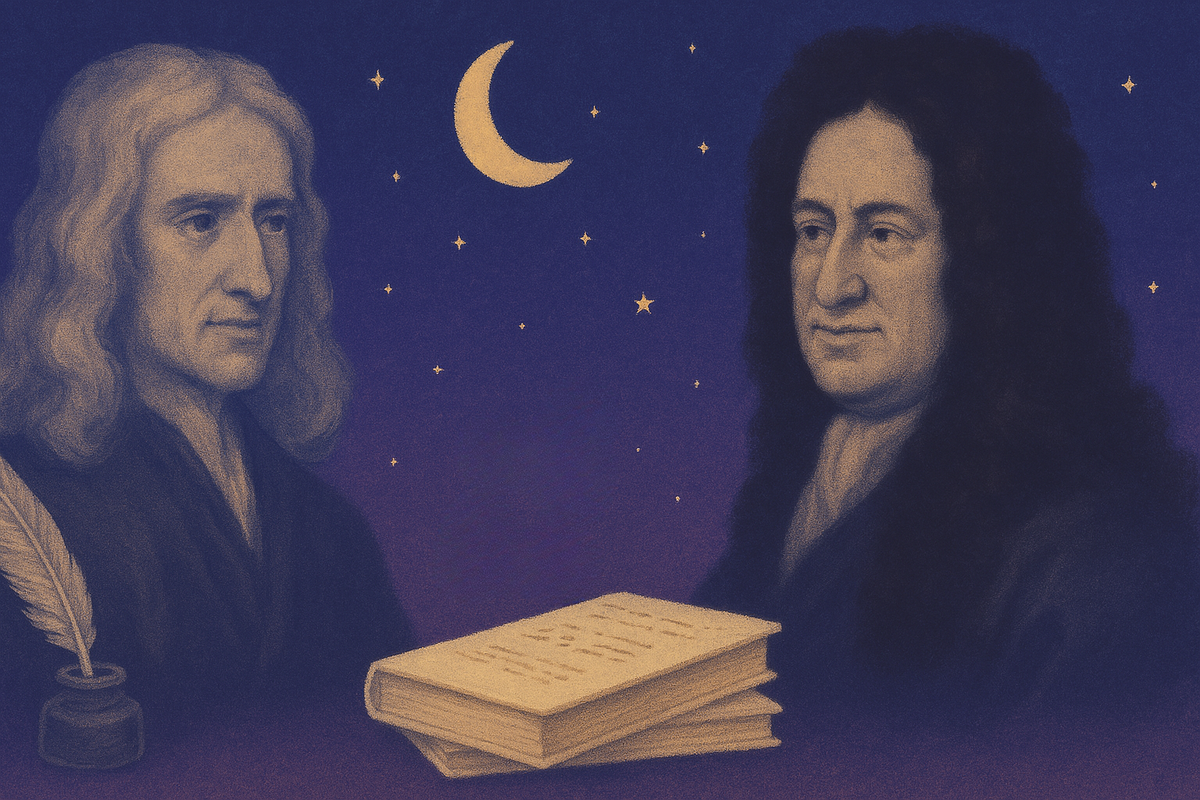The Great Calculus Controversy: Why Mathematical Rivalries Make Perfect Bedtime Stories
What if I told you that one of history's most bitter academic feuds—complete with accusations of plagiarism, international intrigue, and wounded egos—makes surprisingly perfect sleep-learning material?

When you think of bedtime stories, you probably imagine fairy tales or gentle narratives designed to lull you to sleep. But what if I told you that one of history's most bitter academic feuds—complete with accusations of plagiarism, international intrigue, and wounded egos—makes surprisingly perfect sleep-learning material?
That's exactly what we explored in Episode 1 of Dormant Knowledge, where we dove deep into the calculus controversy that pitted Isaac Newton against Gottfried Wilhelm Leibniz in what became known as the "priority dispute" of the 17th and 18th centuries.
Why Mathematical Drama Works for Sleep-Learning
At first glance, calculus might seem like the opposite of relaxing bedtime content. But here's the thing: the story of calculus—the human drama behind the mathematical revolution—is absolutely fascinating in all the right ways for drowsy minds.
The Newton-Leibniz controversy has everything a good story needs: brilliant protagonists, high stakes, international politics, and enough complexity to keep your mind gently engaged without overstimulating it. It's intellectual enough to satisfy curious minds, but human enough to feel like you're learning about people rather than just abstract concepts.
The Perfect Storm of Genius and Ego
What makes this story particularly compelling is how it reveals that even the most brilliant minds in history were, well, remarkably human. Newton—the man who gave us the laws of motion and universal gravitation—was also petty enough to hold a decades-long grudge. Leibniz, the polymath philosopher-mathematician, found himself defending his reputation across international borders through carefully worded academic papers.
The controversy began innocently enough: two brilliant men, working independently, both developed what we now call calculus. Newton developed his "method of fluxions" first, around 1665-1666, but didn't publish it. Leibniz developed his version later, around 1674-1676, but published first, in 1684.
What followed was a priority dispute that lasted decades, involved the Royal Society of London, and created a rift between English and Continental European mathematics that persisted for generations.
Why This Makes Perfect Sleep Content
There's something deeply satisfying about learning that even mathematical geniuses struggled with the same petty human emotions we all face. As you drift off to sleep, you're not wrestling with derivatives and integrals—you're following a story about discovery, recognition, and the very human need to be acknowledged for our contributions.
The mathematical concepts themselves become secondary to the narrative. You learn about calculus not through equations, but through the lens of human ambition and creativity. Your mind can process the bigger picture—how knowledge develops, how discoveries happen, how brilliant people can also be flawed—without getting bogged down in technical details that might keep you awake.
The Bigger Picture: How Knowledge Builds
One of the beautiful things about the calculus story is how it illustrates that revolutionary ideas rarely spring from nowhere. Both Newton and Leibniz were building on centuries of mathematical thinking. They were solving problems that mathematicians had been wrestling with since ancient Greece. The stage was set; they just happened to be the ones who finally put all the pieces together.
This is exactly the kind of perspective that works well for sleep-learning. You're not memorizing formulas or solving problems—you're absorbing a broader understanding of how human knowledge progresses. It's the kind of insight that can settle gently into your consciousness as you relax.
Looking Ahead: More Discovery Stories
The calculus controversy is just the beginning. Next Monday, we're releasing Episode 2, which explores another discovery story with equally fascinating human drama: the finding of Pluto. Like the calculus episode, it's a tale that connects mathematical precision (the kind Newton and Leibniz developed) with human curiosity and determination.
The young astronomer who discovered Pluto was using the same kinds of mathematical tools that emerged from the Newton-Leibniz rivalry. It's a perfect example of how knowledge builds on itself—and how the most extraordinary discoveries often come from unexpected places.
The Sleep-Learning Sweet Spot
What we're discovering with Dormant Knowledge is that there's a perfect sweet spot for educational content designed for relaxation. The material needs to be intellectually engaging enough to capture attention, but delivered in a way that allows your mind to process it without stress or pressure.
Mathematical rivalries, scientific discoveries, and historical mysteries hit this sweet spot perfectly. They're complex enough to be genuinely interesting, but the human stories at their heart are universal and relatable. Whether you absorb every detail or drift off somewhere in the middle, you're still learning something valuable about how our world works and how we came to understand it.
Try It Tonight
If you haven't experienced sleep-learning yet, tonight is the perfect opportunity. Episode 1 is available now on all major podcast platforms. Settle in with your favorite bedtime routine, and let the story of calculus—complete with brilliant minds, wounded pride, and mathematical revolution—gently carry you toward sleep.
Remember: there's no pop quiz tomorrow. No pressure to remember every detail. Just curiosity, comfort, and the quiet satisfaction of learning something fascinating as your mind winds down for the night.
Listen to Episode 1: "The Great Calculus War" above or wherever you get your podcasts. Follow us @dormantknowledge on Instagram and Facebook, or @drmnt_knowledge on X for daily doses of fascinating facts designed for curious minds.
Have a topic suggestion for future episodes? We'd love to hear what fascinates you. Email us at [email protected] or reach out on social media.




